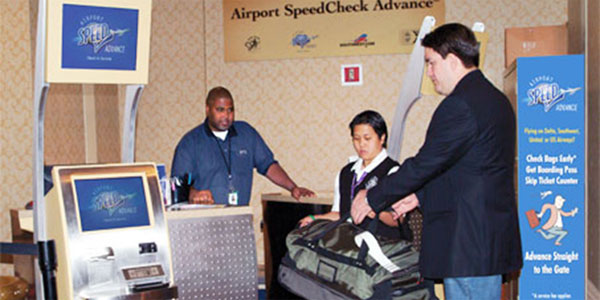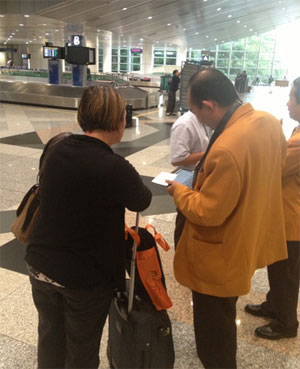For many passengers, the baggage process can be a source of great stress. Having to transport your bags to the airport, queuing up to check them in upon arrival, feeling anxious about whether or not the bag will arrive at the destination, and then the uncertainty if a bag is lost or misdirected all contribute to an aspect of the travel process that passengers would love to see improved.
So, what can airlines and airports do to improve the baggage handling process from the passenger perspective? Here are our top five suggestions:
1. Permanent bag tags
Permanent bag tags are not a brand new concept, but they are starting to gain considerable traction. The permanent bag tag is a reusable tag that makes use of Near Field Communication (NFC) and/or Radio Frequency Identification (RFID) technology, and is designed to replace the traditional paper bag tag. While Qantas was the pioneer with its Q Bag Tag back in 2011, British Airways is currently trialling its own electronic permanent bag tag, and Vanguard ID Systems has recently launched its own permanent bag tag called ViewTag, which satisfies IATA’s standard.
According to Rick Warther, President & CEO of Vanguard ID Systems, ViewTag is “revolutionary”. He said: “This will give data integrity to a system that has never had it before. The current technology relies on probably the worst barcode ever created. Interleaved 2 of 5 and the inherent numbering scheme currently used is seriously flawed. The airlines know this and really want a better solution with data integrity.”
The Vanguard ID Systems solution is the result of 10 years of development, culminating in an IATA meeting along with 16 major airlines in June this year, in which a final design for ViewTag was agreed. The tag uses NFC and RFID technology – the former to change the display on the screen and the latter to allow readers to read the tag at a distance of up to 50 feet (15m).
Warther also explained that the permanent bag tag is “backward compatible and forward capable”, meaning it wouldn’t require the industry to switch overnight from the traditional bag tags to the new alternative. “It’s a tag that can be used in the smallest airport in Africa, or the largest airport in the world,” he added.
2. Home-printed bag tags
It is not realistic to expect all airlines to adopt permanent bag tags in the near future, and similarly, it’s unrealistic to expect all passengers to embrace them. Therefore, an alternative to this is the home-printed bag tag, which has already been implemented by the likes of Iberia and Billund Airport. A key benefit is that it allows passengers to take more control over their own travel experience, while in theory it should also reduce queuing times at the airport, as the passenger only has to drop their bag off rather than check it in and wait for an agent to print and attach the tag.
Marco Sansavini, Iberia’s Chief Commercial Officer, told FTE that the airline’s home-printed bag tag reduces the bag drop process to less than 30 seconds, which would surely satisfy even the most demanding of travellers.
3. Baggage delivery
While permanent and home-printed bag tags can help solve the problems associated with the airport check-in process and the traditional paper bag tag, passengers still have to transport their bags to and from the airport. For a family of four travelling from the airport to their hotel by rail, or a business traveller who has to make their way straight from the airport to a meeting, this can be a stressful experience.
However, there is an alternative. Those flying to and from London will soon be able to make use of a baggage delivery service called AirPortr, which is initially planning to launch at Heathrow Airport in early 2014. The service allows passengers to have their bags delivered directly to their hotel once they land, and from their hotel to the airport for the return journey. Passengers can either book in advance via their smartphone or register to use the service on the day, and they simply have to drop off their bag or collect it from a booth at landside arrivals. Passengers are then able to track the status of their bag using their smartphone and once it has been delivered, they receive an SMS informing them.
Darren Payne, Chief Operating Officer, AirPortr, said: “We provide customers who may be on a short business trip, a weekend city explorer or a full vacation more flexibility and time to do what they want with less stress and burden than travelling with their luggage, whether that is attending that important business meeting or visiting London’s many tourist attractions. Put simply, for any customer travelling without their luggage using the AirPortr service allows them to get to where they need or want to be both quicker and without the stress and burden of carrying their bags.”
At the moment, a similar service called Bags VIP is widely available in the US, but the expansion of services like AirPortr within Europe would make a big difference, especially for business travellers. Furthermore, Payne also explained that AirPortr is exploring the possibility of checking in the bags on behalf of the customer too.
4. Offsite/remote bag drop

Offsite or remote bag drop, which allows passengers to check-in and drop off their bags at a downtown location, is another service that can make the lives of travellers easier. The service is already offered by the likes of Abu Dhabi Airports Company, Las Vegas McCarran International Airport and Air Arabia, but it is yet to become a mainstream offer for passengers. Having the option of dropping off your bag before heading to the airport and not having to worry about it until you land means there is one less thing to worry about at the airport. So, what is stopping more airports and airlines adopting this service?
5. Improved lost luggage reporting and processing

Unfortunately, some mishandled luggage is inevitable and continues to impact a minority of passengers. However, just because the problem will take time to eradicate does not mean airlines cannot make the experience of reporting and processing lost bags simpler.
One airline that is taking the lead on this is Malaysia Airlines, which has been working with SITA to trial the innovative WorldTracer iPad app. Airline agents patrol the arrivals hall at Kuala Lumpur International Airport proactively seeking passengers who are having trouble locating their bags, and if the bag has been mishandled, they can use the iPad app to take the passenger’s details and start the process of having the bag delivered to them.
“At a traditional desk it takes 10-15 minutes to provide all of the information needed to report the missing bag and ensure it is forwarded to the right address,” explained Nick Gates, Portfolio Director at SITA. “Using an iPad, the agent can scan the passenger’s boarding pass, which gives them a lot of the information they need, and we’ve found that it has halved the time taken to process the passenger. On average, it is taking around six minutes per passenger.”
The fact that the passenger can see what the agent is doing and validate the information just by looking at the iPad also helps to reassure them that they will be reunited with their bag.
Making a real difference to the passenger experience
Considering the negative impact that mishandled baggage can have on passengers’ perception of their overall travel experience, combined with the desire of airlines to improve handling rates in order to protect both their reputations and their revenues, it is great to see innovative solutions being developed and deployed.
While each of these solutions have merits on their own, a telling difference could be made if they were implemented concurrently, allowing passengers to choose which service best suits their needs.
For instance, if a passenger could attach a permanent tag to their bag, drop that bag off at a remote check-in facility and arrange for it to be delivered directly to their hotel once they land, it could make a significant difference to their travel experience and their perception of the airports and airlines they have used. Even if the bag is mishandled, a simpler, more reassuring reporting process could help to reduce anxiety and stress. This type of seamless baggage process is what the industry should be aiming for.






